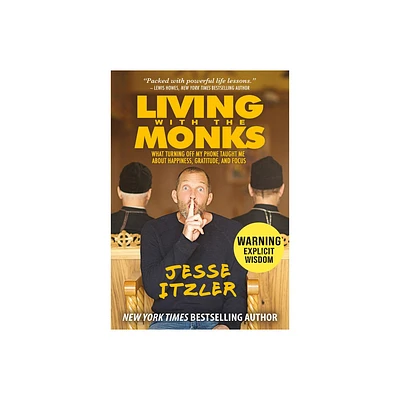Home
It's Monk's Time
Loading Inventory...
Barnes and Noble
It's Monk's Time
Current price: $14.99


Barnes and Noble
It's Monk's Time
Current price: $14.99
Loading Inventory...
Size: CD
*Product Information may vary - to confirm product availability, pricing, and additional information please contact Barnes and Noble
Although often unrightfully maligned by self-proclaimed "purists,"
Thelonious Monk
did some brilliant work during his early- to mid-'60s stint for
Columbia Records
.
It's Monk's Time
(1964) contains some of the best -- if not arguably the best -- studio sides that the pianist cut during his final years as a recording musician. The album's title turned out to be somewhat prophetic, as
Time
magazine featured
Monk
as the cover subject for its February 28, 1964, edition. Interestingly, he was to have been profiled by the periodical the previous November; however, the assassination of then-President
John F. Kennedy
took obvious precedence. It had been almost a full year since his previous studio release,
Criss-Cross
(1963), and there had been a significant alteration in the rhythm section, which now incorporated the respective talents of both
Butch Warren
(bass) and
Ben Riley
(drums) as well as longtime cohort
Charlie Rouse
(tenor sax). From four sessions in early 1964,
gathers four quartet and two solo sides, presenting the pinnacle of what these musicians offered stylistically as well as from the standpoint of presentation. There is sense of mischievous playfulness in
's nimble keyboard work, especially notable on the beautifully off-kilter unaccompanied opening to
"Lulu's Back in Town,"
and the same practically impish quality also drives the solo performance on
"Nice Work if You Can Get It."
Both
pop
standards
are prime examples of the
bop
pioneer's inimitable approach to arranging, and also provide an uncanny insight to his influences. Immediately evident are the styles of
stride
legends from the well-known
Willie "The Lion" Smith
and
James P. Johnson
to the slightly more obscure and decidedly frenetic playing of
Cliff Jackson
, as well as the
ragtime
approach of
Walter L. Rose
. The results are bound together in
's arithmetically advanced delivery and harmonic composition. The combo -- especially
Rouse
-- effectively supports and punctuates the tricky timing of
"Stuffy Turkey"
and the more aggressive
of
"Brake's Sake."
The latter title also unleashes some tasty interaction between
, sonically exemplifying their practically single-minded synergy. The concluding cut,
"Shuffle Boil,"
is one of the lost gems of the artist's later work. It sports an effortless swing over a sophisticated and challenging melodic structure. Bassist
Warren
steps up to the plate, providing a supple and pulsating bed for both
as they trade solos. [In 2003,
Legacy
issued an expanded edition of
with a trio of bonus tracks, two of which were previously unavailable.] ~ Lindsay Planer
Thelonious Monk
did some brilliant work during his early- to mid-'60s stint for
Columbia Records
.
It's Monk's Time
(1964) contains some of the best -- if not arguably the best -- studio sides that the pianist cut during his final years as a recording musician. The album's title turned out to be somewhat prophetic, as
Time
magazine featured
Monk
as the cover subject for its February 28, 1964, edition. Interestingly, he was to have been profiled by the periodical the previous November; however, the assassination of then-President
John F. Kennedy
took obvious precedence. It had been almost a full year since his previous studio release,
Criss-Cross
(1963), and there had been a significant alteration in the rhythm section, which now incorporated the respective talents of both
Butch Warren
(bass) and
Ben Riley
(drums) as well as longtime cohort
Charlie Rouse
(tenor sax). From four sessions in early 1964,
gathers four quartet and two solo sides, presenting the pinnacle of what these musicians offered stylistically as well as from the standpoint of presentation. There is sense of mischievous playfulness in
's nimble keyboard work, especially notable on the beautifully off-kilter unaccompanied opening to
"Lulu's Back in Town,"
and the same practically impish quality also drives the solo performance on
"Nice Work if You Can Get It."
Both
pop
standards
are prime examples of the
bop
pioneer's inimitable approach to arranging, and also provide an uncanny insight to his influences. Immediately evident are the styles of
stride
legends from the well-known
Willie "The Lion" Smith
and
James P. Johnson
to the slightly more obscure and decidedly frenetic playing of
Cliff Jackson
, as well as the
ragtime
approach of
Walter L. Rose
. The results are bound together in
's arithmetically advanced delivery and harmonic composition. The combo -- especially
Rouse
-- effectively supports and punctuates the tricky timing of
"Stuffy Turkey"
and the more aggressive
of
"Brake's Sake."
The latter title also unleashes some tasty interaction between
, sonically exemplifying their practically single-minded synergy. The concluding cut,
"Shuffle Boil,"
is one of the lost gems of the artist's later work. It sports an effortless swing over a sophisticated and challenging melodic structure. Bassist
Warren
steps up to the plate, providing a supple and pulsating bed for both
as they trade solos. [In 2003,
Legacy
issued an expanded edition of
with a trio of bonus tracks, two of which were previously unavailable.] ~ Lindsay Planer


















